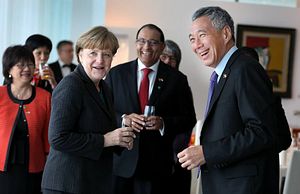On July 6, Singapore and Germany signed a joint declaration on strengthening cybersecurity cooperation. The move highlighted the city-state’s efforts to strengthen ties with like-minded states in the cyber domain as they confront growing challenges there.
As I have noted before, Singapore has been paying keen attention to the cyber domain as a developed, highly-networked country which relies on its reputation for security and stability to serve as a hub for businesses and attract talent.
Cognizant of the growing challenges in the cyber realm – made apparent by attacks on the city-state, including the hacking of the defense ministry’s Internet-connected system in February – Singapore has taken several measures to counter the threat, from the setting up of a new Cyber Security Agency (CSA) in 2015 to the mulling of new laws (See: “Singapore Eyes Tougher Cyber Laws”).
One of the CSA’s main lines of effort is in building partnerships with other countries that Singapore can work with in this area. And it has begun doing so, with six memorandums of understanding (MOUs) already being inked with France, India, the Netherlands, the United Kingdom, the United States, and most recently Australia as I have written about previously (See: “What’s in the New Australia-Singapore Cyber Pact?”).
Singapore officials have already seen Germany as a potential partner in this area and in related fields as well. Singapore’s Law and Home Affairs Minister K Shanmugam has even cited the example of Germany and other European countries like Britain in their efforts to impose penalties on companies like Facebook for failing to remove fake news as the city-state thinks about its own response (See: “Winning Asia’s War on Fake News”).
Last week, during Singapore Prime Minister Lee Hsien Loong’s official visit to Germany for the G-20 meeting, the two countries signed what was officially termed a “joint declaration of intent on cybersecurity cooperation.”
The agreement was signed by David Koh, CSA’s chief executive, and Thomas Fitschen, the director of international cyber policy at the German Federal Foreign Office (FFO).
The declaration covers several areas including information exchanges, joint training and research, and the sharing of best practices to promote innovation in the cyber realm, the CSA said in a statement.
Both countries also committed to promote “voluntary norms of responsible state behavior” to support cybersecurity.
“The inking of this Declaration paves the way for mutual assistance and information sharing which will strengthen the cybersecurity landscape of both countries,” CSA’s Koh said.

































